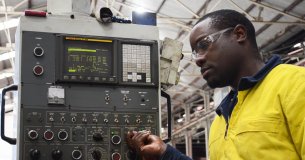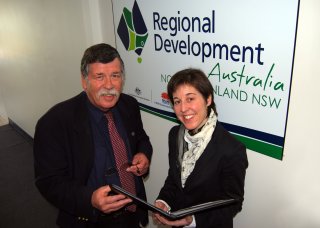-
Featured Items
-
Featured Resources
 Funding & Grants
Don't miss out on funding opportunities. Stay informed with our up to date online listings and email notifications.
Read More
Funding & Grants
Don't miss out on funding opportunities. Stay informed with our up to date online listings and email notifications.
Read More
 Skilled Migration
Our services help both applicants and employers, to learn more, develop plans, submit applications, and settle in.
Read More
Skilled Migration
Our services help both applicants and employers, to learn more, develop plans, submit applications, and settle in.
Read More
 Research and Analysis
Good research and analysis makes the case. How can our resources and services help your project or application?
Read More
Research and Analysis
Good research and analysis makes the case. How can our resources and services help your project or application?
Read More
 Information & Data Resources
With resources like REMPLAN, Regional Knowledge Base, and decades of data, discover how we can help your project.
Read More
Information & Data Resources
With resources like REMPLAN, Regional Knowledge Base, and decades of data, discover how we can help your project.
Read More
-
Stay InformedSubscribe to one or more of our regular email subscriptions, to be kept up to date on news and funding opportunities for the region
-
-
Our Region
- Our Region
- Regional Plan
- Regional Data
- Current Regional Issues
- Population Migration Analysis for 2016-21
- Job Vacancies Continue at All-Time High
- National Debt - What it Means for Our Economy?
- The True Value of Home Solar
- The Economic Impacts of Local Government Amalgamations
- State of the Regions Report 2014-15
- Antifragility - A different take on regional economic development
- Biohubs - Collaborative Waste Management
- Attracting New Residents
- Socio-Economic Impacts of the Murray Darling Basin Plan
- Murray Darling Basin Water Recovery
- Growing Businesses
- The Northern Inland Economy
- Geographical Overview
- Major Industry Sections
- Our Services
- Grants and Funding
-
Skilled Migration
- Skilled Migration
- Skilled Employer Sponsored Regional Visa
- Skilled Work Regional Visa (subclass 491)
- Temporary Seasonal Workers
- Designated Area Migration Agreement (DAMA)
- Helpful Information for Visa Holders
- Information for Employers
- Case Studies
- Payment Details
- Advice & Further Information
- Contact Details
- News & Events
-
Our Projects
- Our Projects
- Current Projects
- Skilled Migration
- Wool Works - Wool Training Schools
- Metal Works - Welding and Fabrication Schools
- Come On Inland
- Stories of Resilience
- Alt Brothers Beekeeping - Glen Innes
- Carelle's Toy Store - Glen Innes
- Greenhill Orchards - Arding
- Gwydir Meats - Warialda
- Kaputar Motors - Narrabri
- Moonbi General Store - Moonbi
- Sandstock - Tingha
- Sherelle Fashions - Tenterfield
- Sleepy Merino - Inverell
- Tenterfield Chamber of Toursim, Industry and Business - Tenterfeild
- The Welders Dog - Armidale
- Walcha Veterinary Supplies - Walcha
- AGCAP - Agribusiness Careers & Professions
- Northern Inland Regional Investment Profile
- Past Projects
- Digital Economy Strategy
- Business Growth Project
- Go Digital
- How to Start an Online Business
- Create Your Website Using Squarespace
- How to Edit Your Squarespace Site - Part 1
- How to Edit Your Squarespace Site Part 2
- Add a Shop to Your Squarespace Site
- Start a Blog and Find out What Customers are Searching
- 14 Tips For a Better Blog Post
- Which Social Media Platforms are Best for Your Business
- How to Use Facebook Effectively For Your Business – Part 1
- How to Use Facebook Effectively For Your Business – Part 2
- Instagram Tips for Business
- Catching Up, More Instagram & Dealing with Haters
- Getting Started with Twitter for Business
- Social Media Scheduling Tools
- How to Start an Etsy Shop – Part 1 – Research
- How to Start an Etsy Shop – Part 2 – Signup
- Online Security for Your Business
- Product Photography and Website Images: Your Guide
- 5 Tips to Improve your Productivity in your Business
- Best Online Business Resources
- How to Improve Your Communication Skills and Win More Clients
- NBN Coordinator
- Putting Power Back in the Regions
- Road Freight Study
- Town Audit Benchmarks
- Food and Wine
- Youth Survey
- Digital TV Switchover Assistance
- Northern Inland Transport Guide
- Live.Train.Work
- Northern Inland Innovation Awards
- Northern Inland Innovation Awards - 2017
- Northern Inland Innovation Awards - 2016
- Northern Inland Innovation Awards - 2015
- Northern Inland Innovation Awards - 2014
- Northern Inland Innovation Awards - 2013
- Northern Inland Innovation Awards - 2012
- Norther Inland Innovation Awards - 2011
- Prime Super Northern Inland Innovation Awards - 2010
- Prime Super Northern Inland Innovation Awards - 2009
- Northern Inland Innovation Awards - 2007
- Northern Lights Project
- NBN Smart Home
- Murray Darling Basin
- Moree Plains Business Workshops
- Namoi Investment Prospectus
- Industrial Land
- Bioenergy and Local Electricity Retailing
- Northern Inland Business Energy Assessment
- Skills for the Future
- Impacts of COVID-19 on Businesses
- Past Projects of NIRDB
- Aboriginal Employment and Enterprise in the Gunnedah Region
- Art as an Industry
- Aviation Survey
- Farm Forestry - Northern Inland Forestry Investment Group
- New England North West Film Strategy
- Northern Inland Excellence in Business Awards
- Food and Wine 2003 - 2008
- Prime Super Northern Inland Innovation Awards 2009
- Regional Business Networking Program
- Regional Leadership Course 2008
- Viticulture Strategy 2002-2003
- About Us
- Contact Us
- Other Resources
- Privacy and Legal
- Search
- News & EventsNews & Events
- NewslettersNewsletters
- RDANI connecting with North West communitiesRDANI connecting with…
Back to Newsletters

RDANI connecting with North West communities
Friday 30th of July 2010

RDANI Deputy Chair Herman Beyersdorf and Project Officer, Kim-Trieste Hastings are pleased with the community input into the Regional Plan to date.
Regional Development Australia Northern Inland (RDANI) is now taking its public consultation process to the North West. RDANI is building a Regional Plan that both State and Commonwealth Governments will use to determine funding allocation. The aim of the meetings is to capture a cross section of grass-roots insights about what needs to be done towards the region’s development and how, directly from around 19 communities.
Meetings have already occurred in Glen Innes, Deepwater, Tenterfield, Bingara and Barraba. RDANI Project Officer, Kim-Trieste Hastings is co-ordinating and attending all of the meetings. “So far, they have been well attended, with a range of local issues and common regional concerns being discussed,” she said.
The next round of RDANI public consultation meetings will take place at the following venues:
- Werris Creek at the Werris Creek Bowling & Tennis Club, Tuesday 3 August, 1:30pm – 4:00pm
- Quirindi at the Council Chambers, Tuesday 3 August, 6:00pm – 8:30 pm
- Manilla at the Town Hall, Wednesday 4 August, 1:00pm – 3:30pm
- Gunnedah at the Council Training Room, Wednesday 4 August, 6:00pm – 8:30pm
- Inverell at the Inverell RSM Club, Monday 9 August, 6.00pm – 8.30pm
- Tingha at the Tingha Recreation Club, Monday 9 August, 10:00am -12:30pm
- Warialda at the Warialda Golf and Bowling Club, Tuesday 10 August 6:00pm-8:30pm
- Ashford at the Ashford Central School, Wednesday 11 August, 1:00pm-3:30pm
- Moree at the Max Conference Centre, Thursday 12 August 6:00pm-8:30pm
According to Deputy Chair of RDANI, Herman Beyersdorf, getting out and communicating with communities is extremely important. “RDANI is a body that is jointly funded by the Federal and State Governments. These public consultation meetings are a valuable and practical way to ensure that regional development efforts in the Northern Inland region are relevant and responsive to local communities,” he said. “I hope we continue to see attendance and contributions from industry and community leaders, particularly people in Local Government. As a regional body, we must connect with the 13 councils throughout the Northern Inland.”
The tangible outcome from the meetings and other research conducted at the University of New England, will be a Regional Plan, designed to identify and outline responses to developmental challenges in the region. Local level issues and priorities will be collated into this strategic plan for Northern Inland NSW. The Plan will become the strategic blueprint that RDANI will work to for the next five to ten years. It will also serve as a resource tool that will put Federal and State Government representatives in touch with the region. The Regional Plan is due to be submitted to the Government at the end of August.
Related Pages







 Latest News
Latest News
